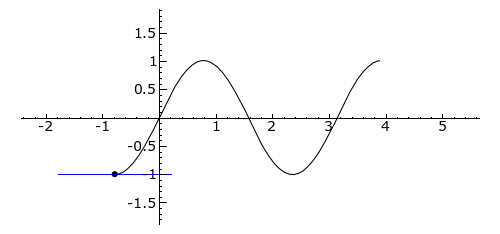Inflection Points
The Tipping Point
The critical point in a situation, process, or system beyond which a significant and often unstoppable effect or change takes place
Inflection Points - Overview
Inflection points occur when there is build up of forces, a critical mass, that lead to a spontaneous and often irreversible change of direction.
The word "inflection" is derived from the Latin "inflectere", meaning "to bend."
Example of inflection points are:
- In business the point at which an issue, an idea, a concept, a product, crosses a certain threshold and achieves significant momentum that is triggered by some small factor or change.
- In medicine, and taking the covid-19 pandemic as a good example, the point at which a minor development precipitates a crisis, such as every infected person brings us closer to the tipping point, when the outbreak becomes an epidemic.
- In physics, the point at which an object is no longer balanced, and the addition of a small amount of weight causes it to topple.
- In relationships, the point at which the accumulation of a number of negative behaviours and factors reaches a point of no return and one party terminates the relationship.
Shane Parrish of the excellent Farnam Street which focuses on mental models says:
Inflection Points in Groups Of People

People in groups or crowds behave differently to how they behave as individuals.
Being part of a group causes people to be less inhibited, more
rebellious, and more confident. This effect is also referred to as "mob behaviour".
Crowd Psychology And Change
The 19th century psychologist and sociologist Gustav Le Bon author of "The Crowd: A Study of the Popular Mind" looked at the formation of critical masses of people required to ignite a change. Le Bon proposed the idea of a collective unconsciousness whereby individuals in a group become as “a grain of sand amid other grains of sand which the wind stirs up at will.”
Le Bon suggested that there are 3 key elements which create the critical mass required to ignite a change:
- Anonymity
- Contagion
- Suggestibility
When all three elements are present, he proposed that a group loses its sense of self-restraint and behaves in a manner he considered to be more primitive than usual.
He also proposed that the strongest members (the early adopters] have power over the rest of the group.
Popular journalist Malcom Gladwell author of "The Tipping Point: How Little Things Can Make a Big Difference"cites The Pareto Principle in which I looked at the famous 80/20 rule and made the point that within the critical change-making 20% there is smaller subset who are most responsible for instigating the change.
1% Of A Group Can Account For Over 50% Of The Effect On the Total Population
I referred to this as the Fat Tail Fractal Factor which basically means that the 80/20 rule can be applied to itself twice - which in this context means that 1% of a group can account for over 50% of the effect.
Gladwell states that there are 3 categories of people who are instrumental in the creation of tipping points and will likely fall within the 20%:
- Connectors - These are
highly gregarious, sociable people with large groups of friends. Gladwell defines
connectors as those with networks of over one hundred people.
- Mavens - These are the trusted experts who share their knowledge and insights who share information and pass on knowledge on through word of mouth.
- Sales people - The charismatic, slightly manipulative people who can, and do, persuade others to accept what they say.
10% Of A Population Is All That's Needed To Create A Critical Mass
According to research conducted by Professor Boleslaw Szymanski of Rensselaer Polytechnic Institute the percentage of a population necessary to create a critical mass is 10%, he says:
"When the number of committed opinion holders is below 10 percent, there is no visible progress in the spread of ideas. It would literally take the amount of time comparable to the age of the universe for this size group to reach the majority. Once that number grows above 10 percent, the idea spreads like flame."
The Intransigent Minority
Nassim Taleb writing about complex systems takes this point a stage further with his thoughts on the "intransigent minority" and the "dominance of the minority"and proposes that this minority need be no larger than 3 or 4% of the whole population.
I put more weight behind his views than those of Le Bon and Gladwell because Taleb is [amongst other things] a mathematical statisitician. Interestingly, his 3 to 4% falls illustrates the point made above about the Fat Tail Fractal Factor - specifically the 80/20 rule applied to the 20% i.e. 20% of 20= 4%.
In Summary, All It Takes Is Between 4% and 10% Of Opinionated, Intransigent People To Form A Critical Mass and Create A Tipping Point In A Population
So to conclude, however you "slice and dice" this, somewhere between 4% and 10% of dominant, intransigent, opinionated people who contain some good communicators amongst their number is all it takes to effect a major change in a whole population - whether this constitutes a large group, a whole country or a group of countries.
In my view this is well illustrated by the influence over the past 10-20 years of the so called "liberal elite", and in more recent times "woke thinking" as epitomised by the "cancel culture" that is both endemic and systemic within Western universities, government and public life.
Another example is the current dominance of the minority group "Black Lives Matter" who have hijacked and subverted the race agenda with their skewed viral narrative of the George Floyd tragedy.
N.B. You are perfectly entitled to disagree with me on any of these points as I am perfectly entitled to express my view on my own website.
Inflection Points in Personal Relationships

Inflection points in personal relationships affects us all.
How many times in your life have your reached a tipping point in a relationship with someone where you finally decide that "enough is enough"?
In "Knowing When To Quit" I discussed 3 key questions to help you decide when to quit a job or a relationship:
- How much time are you willing to spend?
- How much money are you prepared to spend/lose?
- How much pain are you willing to put up with?
My personal view is that there is an important difference between quitting a project or a job and quitting a relationship:
- Quitting a project or a job is about opportunity cost
- Quitting
a relationship is to do with toxicity
Over the years I have found that the point at which a personal relationship becomes toxic is the point at which to quit.
We all have different thresholds of what we find acceptable and can tolerate in relationships. Here are 3 examples of toxicity in relationships that I have experienced or observed up close.
Have predefined boundaries and "when to quit points"
Broken hearts and shattered dreams....
Examples
He has the capacity to further your career or business interests.
# Ask yourself - has this relationship reached a level of toxicity where the pain outweighs the potential commercial gain?
She is so lovely and beautiful that you can't face not having her in your life.
You are in a situation where the sunk cost fallacy applies. In essence you feel that you have invested so much time, energy, money and/or love in someone and the longer you have been together the harder it is to break up... and it becomes a fallacy when it’s pushing you to do things that are making you unhappy or worse off.
# Ask yourself, if he/she had behaved like this in the early stages of your relationship - would you be still be together now?
This
one applies in mentoring situations and/or situations where your
protective and supportive nature is heavily invested and your natural
courtesy and your values keep you going longer than you should....
# Apply the "3 strikes and you quit" rule. If the other person has persistently continued with their toxic behaviour despite your requests for them not to behave like this then their behaviour shows their true current priorities, and to mix our metaphors, I would suggest that you stop "casting your pearls before swine".
[i.e. you are wasting your time by offering something that is helpful or valuable to someone who does not appreciate it or understand it.]
As a footnote, I have found that the older I get the less tolerant I become as I have seen it all before and recognise the patterns of behaviour earlier, plus life is so short and I want to optimise my time, my energy my friendship and my love.
Return from "Inflection Points" to: Mental Models
LATEST ARTICLES
Living in Survival Mode Without Surrendering Mental Authority
Living in Survival Mode Without Surrendering Mental Authority
 Clear Thinking When You’re Just Trying to Stay Afloat. Many people today are overwhelmed because they are living in survival mode - not temporarily, but as a persistent condition of life. For many, th…
Clear Thinking When You’re Just Trying to Stay Afloat. Many people today are overwhelmed because they are living in survival mode - not temporarily, but as a persistent condition of life. For many, th…Manifestation Without Magic: A Practical Model
 Manifestation without magic is not a softer or more intellectual version of popular manifestation culture. It is a different model altogether. Popular manifestation teachings tend to frame reality as…
Manifestation without magic is not a softer or more intellectual version of popular manifestation culture. It is a different model altogether. Popular manifestation teachings tend to frame reality as…Staying Committed When You Can't See Progress - The Psychology of Grit
 Uncertainty Is Not The Absence Of Progress, Only The Absence Of Reassurance. One of the most destabilising experiences in modern life is not failure, but uncertainty and staying committed when you can…
Uncertainty Is Not The Absence Of Progress, Only The Absence Of Reassurance. One of the most destabilising experiences in modern life is not failure, but uncertainty and staying committed when you can…The Battle For Your Mind - How To Win Inner Freedom In A Digital Age Of Distraction
 From External Events to Inner Events. We often think of “events” as things that happen out there: the traffic jam, the rude comment, the delayed email reply. But what truly shapes our experience is wh…
From External Events to Inner Events. We often think of “events” as things that happen out there: the traffic jam, the rude comment, the delayed email reply. But what truly shapes our experience is wh…How to See Your Thoughts Without Becoming the Story
 A Practical Guide to Thought-Awareness. You can spend your life inside the stories of your mind without ever learning how to see your thoughts clearly and objectively. Most of the stuff we tell oursel…
A Practical Guide to Thought-Awareness. You can spend your life inside the stories of your mind without ever learning how to see your thoughts clearly and objectively. Most of the stuff we tell oursel…The Collison Decision Matrix - A Simple Framework for Better Choices
 The Collison Decision Matrix Is A Practical Everyday Thinking Tool. Most of us spend a surprising amount of time worrying about decisions. From small ones such as what to wear, what to eat, what to te…
The Collison Decision Matrix Is A Practical Everyday Thinking Tool. Most of us spend a surprising amount of time worrying about decisions. From small ones such as what to wear, what to eat, what to te…The Power Of Asking The Right Question
 The Power Of Asking The Right Question Lies In The Quest For Insight. To experience the power of asking the right question you must develop the practice of asking questions. The best way to improve th…
The Power Of Asking The Right Question Lies In The Quest For Insight. To experience the power of asking the right question you must develop the practice of asking questions. The best way to improve th…Site Pathways
 Here is a site pathway to help new readers of Zen-Tools navigate the material on this site. Each pathway is based around one of the many key themes covered on this site and contain a 150 word introduc…
Here is a site pathway to help new readers of Zen-Tools navigate the material on this site. Each pathway is based around one of the many key themes covered on this site and contain a 150 word introduc…How To Live With Contradiction - Beyond Thought Let Stillness Speak
 A major impact on so many peoples' lives is the situational contradiction of unfilled realistic expectations. So where does all this leave us? Well here we are, with mental equipment that is more lim…
A major impact on so many peoples' lives is the situational contradiction of unfilled realistic expectations. So where does all this leave us? Well here we are, with mental equipment that is more lim…How To Trust The Process Of Mindfulness - Right Now
 In mindfulness, the process isn’t some distant goal — it's what is happening right now. When we talk about how to trust the process of mindfulness the credibility of the process is heavily dependent…
In mindfulness, the process isn’t some distant goal — it's what is happening right now. When we talk about how to trust the process of mindfulness the credibility of the process is heavily dependent…Inner Mastery For Outer Impact - Mental Clarity For Effective Action
 Insights only matter if they translate into consistent action. In a world crowded with quick fixes and motivational soundbites, the theme “Inner Mastery for Outer Impact” calls us to something more e…
Insights only matter if they translate into consistent action. In a world crowded with quick fixes and motivational soundbites, the theme “Inner Mastery for Outer Impact” calls us to something more e…
